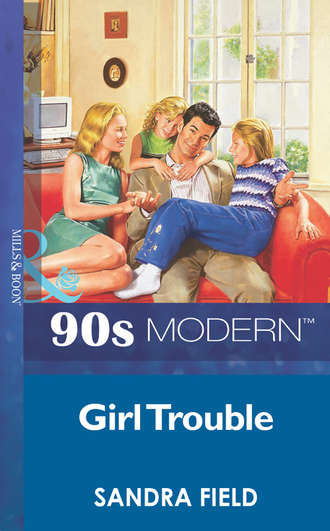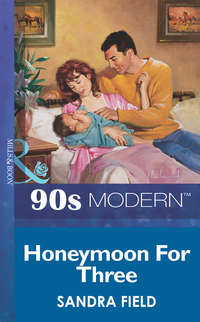
Полная версия
Girl Trouble
“Go for it, Mum. And say hello to him for me.” Cade went on to chat about other things, describing the new deck that had been built on the front of his house in French Bay, and asking her advice on colors for the bathroom. Then he said, rather mendaciously, “I saw someone the other day who reminded me of Ray Cartwright Do you know if he and Lorraine live in Halifax?”
“I don’t think so. Shortly after they got married they moved to Toronto. As far as I know, that’s where they still are.” Nina sniffed. “He wasn’t someone you’d want to invite for tea. And I’d always hoped you’d forgotten her.”
I wish I had.
For a horrible moment Cade thought he’d spoken the words out loud. He said, even more mendaciously, “I have, of course... If I put dark green tiles on the kitchen floor, what shade of paint should I go for?”
Nina gave this her serious consideration and the subject of Lorraine was dropped. After accepting an invitation to Sunday dinner, Cade put down the receiver and took out the phone book. There were two L. Cartwrights listed, no Ray Cartwright, and the only R. Cartwright lived in an area of town Ray wouldn’t be seen dead in.
What was he playing about at? Even if he dialed both L. Cartwrights and one of them was Lori, she wouldn’t speak to him. She’d made that all too clear today.
He remembered the look of appeal she’d given him, the huskiness in her voice when she’d pleaded with him to leave her alone. He’d sneered at her, accused her of manipulation. But what if he’d been wrong? What if her appeal had been genuine? Was Ray the reason she was so frightened? And what were the scars she’d referred to?
She hadn’t made that up. He’d swear to it.
Did Ray mistreat her?
Lori was five-foot-eight, fit and agile. But she’d be no match for Ray, who’d always been a heavy man, only a couple of inches shorter than Cade’s six-feet-two. To think of Ray grabbing at Lori, forcing himself on her, made Cade feel sick. He closed his eyes, a murderous rage almost choking him. I’ll kill the bastard if that’s what’s going on. Kill him and ask questions afterward.
Right, Cade, he thought savagely. That’d realty simplify Lori’s life. If she’s afraid of Ray, the best thing you can do is keep your distance. Just as she requested. Don’t talk to her. Don’t go near the gym at the times of her classes. Stay away from her kids. And quit mooning over the phone book as if you’re a lovesick teenager. You turned thirty-four last month and it’s time you let go of the past.
Alone is the way you’ve operated for years. Stick with it.
He jammed the book back in the drawer and slammed it shut. That’s exactly what he’d do. Let go of her. Stay away from her. Forget about her. Maybe even date other women. That way he might get lucky and get laid.
Miguel, the mechanic at the garage who specialized in Hondas, had a sister who loved movies. Cade liked movies, too. He’d ask Miguel’s sister to go with him when The English Patient opened next week. That’s what he’d do.
It would beat sitting around his apartment worrying about Lori Cartwright and proving the old adage that you always wanted what you couldn’t have. He was going to prove that adage wrong. Even if he had to date twenty different women until he found one who was interested in him but not the slightest bit interested in wedding rings.
He picked up his book, the novel that had won the Booker Prize last year, and determinedly began to read.
There was nothing wrong with Cade’s self-imposed advice to stay away from Lori. It was an admirable stance and should have solved all his problems. Except that twice in the next week he saw her, each time by accident. And each time stirred him up in ways that made his advice meaningless.
His apartment was in the north end of Halifax, only four or five blocks from the garage. The north end wasn’t the fashionable part of the city; but Cade liked his apartment, which took up the whole second floor of an older house, had a fireplace and hardwood floors and spacious rooms with interesting nooks and crannies. And he enjoyed the walk to work each morning, finding that by now he was chatting with the old fellow who owned the corner store, and saying hello to people he passed every day on the street. It gave him a feeling of belonging; he hoped he’d find the same thing true of French Bay when he moved out there.
He liked feeling that he belonged. Nine years of wandering the globe had been long enough.
Three days after the aerobics class, Cade was striding down the street at eight twenty-five in the morning. He was in a self-congratulatory mood. Last night was the first night he hadn’t dreamed about Lori, one of the highly erotic dreams that had haunted his sleep ever since he’d bumped into her at the gym. The cure was working. The past was assuming its proper place. Today he’d ask Miguel about his sister.
He glanced down a side street to check on the progress of the chrysanthemums that for the last few days had been a glorious tangle of scarlet, yellow and bronze in the garden beyond a secondhand clothing store run by a well-known charity.
A woman in a blue jacket was crossing the sidewalk to enter the store. Cade nearly tripped over the curb.
It was Lori Cartwright. She opened the door and disappeared inside.
Lori? In a secondhand clothing store? Lori, who used to spend more on one dress than Cade’s father earned in a week?
She must be volunteering there.
Of course. That was it.
That was nice of her, he thought, and found himself turning down the street. He was only going to take a closer look at the chrysanthemums; he’d like to start a garden once he was settled at French Bay.
He looked through the window of the store. Another woman was seated behind the counter, reading; Lori, still wearing her blue jacket, was going through a rack of girls’ clothing.
He was watching a film that somehow had gone wrong, Cade thought crazily; its script had got muddled up with that of an entirely different film. A surreal film. Then, as if she felt the strength of his gaze, Lori glanced over her shoulder and saw him. The look of horror on her face should have been funny and was not. She ducked her head, turned her back and couldn’t more clearly have told him to vanish from her sight. From her life. Forever.
Leave me alone...please.
Cade pushed open the door and marched over to her. “What’s up, Lori?” he demanded with something less than diplomacy. “Ten years ago you wouldn’t have been found within five blocks of a place like this.”
She straightened to her full height, her blue eyes blazing. “How many times do I have to tell you I don’t need you in my life? That doesn’t seem like a very complicated message and I don’t understand why you’re not getting it.”
“I just want you to tell me what’s wrong!”
“The only thing wrong is that you won’t leave me alone.”
The woman at the counter said in a carrying voice, “Need a hand, Lori?”
“No thanks, Marta—he’s leaving. Right now.”
Cade grated, “The only reason I’m leaving is because I’ll be late for work if I don’t.”
As an exit line it lacked a certain punch; but it was the best he could come up with. Cade strode out of the store and down the street, the chrysanthemums forgotten.
Had Ray lost all his money? After all, the recession was still on and bankruptcies were common. Why else would Lori be buying her children used clothing?
The reasons were nothing to do with him. Any more than she was. He crossed the main street, his jaw set.
Even though they’d been busy yelling at each other, he’d seen how tired she looked. Part of him wanted to sweep her up in his arms, carry her to his apartment and look after her, this woman who’d scorned and humiliated him. Look after her and make love to her, he thought with a twist of his mouth. Make love to her day and night, and to hell with her children and her husband. And if that wasn’t an unrealistic and totally mad scheme, he didn’t know what was.
All day Cade worked like a man demented; and he didn’t speak to Miguel about his sister.
On Saturday morning Cade decided to drive across town to check out stereo equipment; he wanted speakers installed throughout the downstairs and part of the upstairs of the house at French Bay. After a series of the mild, sunny days so characteristic of September in Nova Scotia, rain was now pelting the windy streets, glistening on the tossing leaves of the maples and collecting in puddles because the drains couldn’t carry it away fast enough. No day for umbrellas, Cade thought, and with a dizzying thud of his heart saw that the woman running toward the bus shelter was Lori, her head down against the rain.
I’m doing my level best to avoid you. To forget about you. So why the devil do I keep meeting up with you?
Because Halifax is a small city?
Because I’m meant to?
She was wearing her blue jacket and carrying a kit bag. She must be on her way to aerobics.
He glanced in his rearview mirror and pulled over to the curb, being careful not to splash her. Rolling the window down, he shouted, “Get in—I’ll drive you!”
As Lori recognized him, shock fixed her features into a mask; rain was streaming down her cheeks as if she were weeping, and her jacket was plastered to her body. She turned her head to see if the bus was coming in a movement as jerky as a puppet’s on a string. Only then did she grab the door handle and plunk herself down on the seat beside him.
Take it cool, Cade told himself, and said easily, “Just push that black button, it’ll raise the window again. Do you get much of this kind of weather in Halifax?”
Lori fussed rather unnecessarily with her seat belt. “Not often,” she said in a smothered voice.
She pushed back her hood. Her hair was a loose tumble of wheat-gold curls and her cheeks were pink from running. Every nerve Cade possessed tightened to an unbearable pitch. She was so close, yet so unutterably out of reach. Forcing himself to concentrate, he pulled back into the flow of traffic. “Are you going to the gym?”
She nodded, and again he was reminded of a marionette: this, in a woman normally so graceful. “If it’s not out of your way,” she said.
It was, and he couldn’t have cared less. “You don’t have the girls with you,” he said at random.
“I was able to get a sitter.” She shot him a quick glance. “Do you live near here?”
“On Whitman Street.”
“Oh,” she said faintly. “Where are you working?”
“At the garage on the corner near the Commons.”
They’d pulled up at a set of lights. Without even knowing he was thinking it, Cade heard himself blurt, “Lori, if you ever need help for any reason, all you have to do is ask me.”
The words replayed themselves in his head. He ran his fingers through his damp, untidy curls. “And what that was all about I don’t have a clue. But—” he gave her a sudden, wide smile devoid of calculation “—I mean it. Every word. It can be for old times’ sake, if you like.”
She was staring at him, her jaw gaping, her eyes dazed. Hastily he added, “What’s wrong?”
In a rush she whispered, “I’d forgotten your smile. There’s something about it...it makes me feel...oh God, I don’t even know what I’m talking about.”
His heart was now racketing around his chest like a ping-pong ball gone berserk, and again the words came from a place far from conscious thought. “You can say whatever you like to me, Lori. I mean that, too.”
She looked down at her hands, clasped in her lap. “No, I can’t,” she muttered, and to his horror he saw that the moisture gathered on her lashes wasn’t rain now, but tears.
“Lori—” Someone in the next lane blasted a horn at him, and hurriedly Cade paid attention to his driving; the wipers swished over the windshield and the tires hissed on the wet pavement.
In a voice so low he had to strain to hear it, Lori said, “Forget this conversation, Cade, forget it ever happened. I’m tired, that’s all. And I’ve always hated the wind.”
“That’s right,” he said slowly, “you told me once how you got lost on a windy day when you were only little.” The day she’d told him, he’d been polishing one of her father’s cars and she’d come to get her little red sports car to go to a horse show. “You were wearing jodhpurs and a yellow shirt, and the wind grabbed your scarf—do you remember? I ran after it, and luckily it caught in the lilacs.”
“They’d been in bloom for over a week—it was a good year, they were like purple foam all along the driveway.” She bit her lip. “Do we ever forget anything?”
Another man might have missed the anguish underlying her question. Cade did not. “Not much,” he said. “In my experience. But I would have thought your memories were happy ones.”
“Would you?” she said sardonically. “Then you’d be wrong.”
It wasn’t an opportune moment for Cade to remember the night when he’d walked home alone through the woods; how the three men had loomed out of the darkness, taunting him as they’d backed him against a tree, laughing raucously as he’d gone down, helpless, beneath a hail of blows and kicks. He said in a clipped voice, “We’re nearly there. I hope your class goes well.”
Flinching at his change of tone, Lori visibly retreated from him. “Thank you for the ride,” she said with formal exactitude.
Then he was pulling up in front of the gym and she was climbing out of the car. He kept silent, his hands gripping the steering wheel as if it were a thoroughbred as volatile as the big bay mare she used to ride. Lori slammed the door and ran up the steps. Cade drove away.
So much for detachment. As for exorcism, he was going to exorcise that word from his vocabulary. What on earth had persuaded him to blurt out that ridiculous offer of help?
His eyes flicked down to the little finger on his left hand, the one that had healed crooked. Lori was the reason he’d been beaten up. She might have forgotten that. But he hadn’t.
Nor ever would.
In a foul mood he drove to the music store, spent more money than he’d planned on the speakers, and took them out to French Bay. The wind had churned the sea into a froth of white and dirty gray; ragged clouds skudded across the sky, while the spruce trees that sheltered the house were madly waving their arms. The plumber hadn’t turned up on Friday as promised, and the electrician had left a note that he’d run into a problem with the wiring. Wondering why he’d saddled himself with a rundown old house and ten acres of granite and scrub spruce, Cade paced through the empty rooms, trying to work out where he wanted the speakers to go.
He was having dinner with Sam that night, and with his mother and Wilbur tomorrow night. Right now he was exceedingly glad to be busy both nights. All the less time to think about Lori Cartwright.
Because the nights were unquestionably the worst.
That evening Sam took Cade to his favorite steakhouse. “Eat up, boy,” he urged. “You look like you’ve been dragged through a knothole backward.”
Cade raised his beer in salute and described the various problems of French Bay. Sam listened, offered some suggestions and tucked into nachos and salsa. They ordered second beers and the steaks arrived, along with steaming baked potatoes and crisp Greek salads. “I’m hungry,” Cade said. “I didn’t eat lunch, now that I think about it.”
“You planning on moving out to the shore with a woman?” Sam asked, dumping a dollop of sour cream on his potato.
Cade’s knife slipped. “No.”
Sam said obliquely, “If a car’s a real lemon, you sell it and take your losses. You don’t keep pouring good money into it.”
Cade had spent the latter part of the day trying to settle into reading, watching television or studying the stock market, all without success. “Consign it to the scrap heap?” he said ironically. “You speaking from experience?”
Sam grimaced. “Nope. After Bonnie died I never had the heart to get out there and start looking. Dating? At my age? Didn’t seem proper, somehow.”
Cade had the grace to look ashamed; he’d known what a blow it had been to Sam to lose his wife of many years. “My mother’s got a new man friend,” he said. “It’s never too late, Sam.”
“Miguel’s sister’s a real pretty gal. Hair as black as yours, loves to dance.”
“And what,” said Cade carefully, “if the car that’s a lemon is the first car you ever owned, and you’re not sure you can sell it? Then what do you do?”
“If you’re a young fellow, you park it out back on blocks and get yourself a new one for driving down the street,” Sam said. “At your age you don’t want to be spending every weekend polishing the old one. Not like me.”
It was on the tip of Cade’s tongue to tell Sam the whole sorry story. But ever since he was a kid, he’d been in the habit of keeping his own counsel; he’d always done more fighting in the school yard than talking. “I only met Bonnie a couple of times,” he said, “but I liked her. How did the two of you meet?”
As Sam began to talk, Cade listened; he was a better listener than a talker, he knew. It was one of his mother’s complaints. Her other complaint was that he wasn’t making any moves to present her with grandchildren.
Two little blond girls called Rachel and Liddy.
Sure thing, Cade. You planning on abducting another man’s children? You know darn well when you go to Juniper Hills tomorrow, you’re not even going to mention Lori’s name.
When Sunday evening came, it was a resolution Cade kept. He just wished it was as easy to stop thinking about her.
Another week passed. At French Bay the plumber finished the bathroom and the speakers were installed; at Sam’s garage Cade made noticeable strides toward being accepted by the rest of the mechanics, a couple of whom had resented an outsider from Ontario coming in as Sam’s partner. But Cade wasn’t only a hard worker and highly skilled mechanic; he was also fair in his dealings, and knew when and how to put his foot down. After a standoff one morning between him and Joel, the unacknowledged leader of the other men, a standoff Cade won hands down, the hierarchy was established and even Joel started joking with him. Cade was pleased by this development. He liked the garage. Liked it a lot. The fact that it was a small gold mine was a bonus.
On Saturday he went in early to further his acquaintance with Sam’s haphazard and highly original methods of bookkeeping. Cade had taken some business and accounting courses in Seattle; soon, and as tactfully as he knew how, he must suggest some changes. A computer, to start with. Revenue Canada wouldn’t be amused by receipts stored in an old cardboard box that had once held engine oil.
At one o’clock he called it a day. He’d go to the weight room then go for a run; by the time he got to the gym Lori would have left.
He wasn’t going to think about Lori.
But when Cade pushed open the gym door, the first thing he heard was Liddy’s unmistakably shrill voice raised in outrage. She was sitting bolt upright in one of the padded chairs, her little cheeks scarlet. “He is so coming back!”
“He’s not. Mum said he’s not!”
Even Rachel looked upset; she was. twirling a long strand of her hair with agitated movements. Then Liddy faltered, “He’s my daddy. He can’t stay away, not forever.”
“They’re divorced,” Rachel retorted. “Mum told you all about that, you know she did.”
Liddy looked on the verge of tears. “I don’t care about their silly ol’ divorce. I just want him to come home.”
“Well, he’s never going to,” Rachel said sullenly.
At the same moment that Liddy burst into noisy and copious tears, Cade looked up. Lori was standing in the doorway that led from the front desk. Standing as if she were glued to the floor. Staring at him.
You lied to me, he thought, impaling her on his gaze. You’re not a married woman, you’re divorced. You’re free.
Like two drums with different rhythms, the words banged at his skull. You lied. You’re free. You lied. You’re free. Dimly he wondered if he looked as stunned as he felt. By the way she was transfixed to the floor, he probably did.
Then Liddy saw her mother, too. She erupted from her chair and flung herself across the carpet into her mother’s arms, sobbing, “Daddy’s coming back someday, isn’t he, Mum?”
“No,” Lori said steadily, still staring at Cade, “he won’t be coming back, darling. I told you that.”
“I didn’t think you meant it,” Liddy wailed.
“I knew you meant it,” Rachel said, slouching over to join them.
“He moved to Texas,” Lori said with the same dead calm. “That’s a long way away, Liddy.”
“Cowboys live in Texas,” Liddy snuffled.
“Your father lives in a city, darling. He doesn’t like the country, remember?”
Rachel patted Liddy awkwardly on the shoulder. “We’ll be late for the movie, Liddy, and you know how much you want to see it,” she said and pulled a ragged bunch of tissues from the pocket of her jeans. “Here, you can have these.”
Liddy scrubbed her cheeks with the tissues, Lori dragged her eyes away from Cade’s and glanced up at the clock, and Rachel said in an agony of frustration, gesturing through the tall glass windows, “Oh no, there goes the bus—we’ve missed it! And we’ve waited all week to go to the movies.”
She, too, looked about ready to burst into tears. Cade said stiffly, “I’ll drive you. That way you’ll get there in time.”
“We can’t do that,” Lori protested. “We’ll—”
Rachel gave Cade a dazzling smile. “You’re Mum’s friend, aren’t you? The one who spoke to us the other day. Come on, Mum, you know how much Liddy wants to see all the dalmatians, and it might not be on next week. Let’s go.”
There were no flies on Rachel, thought Cade. “My car’s out in the parking lot. What time does the movie start?”
“One forty-five,” Lori muttered. “My class ran late.”
“We can make it in lots of time,” Cade said. His smile was mocking, because Lori was caught and she knew it. Once the three of them had been for a drive in his car, he’d be officially accepted as a friend of the family. As a friend of Lori, single mother and divorcée. A woman who was no longer the wife of Ray Cartwright.
Texas wasn’t far enough away for the likes of Ray Cartwright. But it sure beat Halifax. Cade felt quite extraordinarily happy.
Rachel grabbed her mother’s hand while Liddy glowered at Cade. Liddy didn’t like him, that much was clear. Cade knew very little about children, and in consequence tended to treat them as smaller size adults. He said calmly, “I know I’m not your dad, Liddy...all I’m doing is giving you a ride to the movies.”
Liddy buried her face in her mother’s jacket. “The movie will cheer you up,” Lori said, “so we’re going to accept Cade’s kind offer... although weren’t you just arriving, Cade?”
“Yep. But I’ve got all day.”
“No heavy dates?” she flashed, then blushed scarlet as if she’d meant to think the words, not say them.
“Not unless you call dinner with my mother in return for fixing her car a heavy date,” he said, and recklessly decided to call the emotion that crossed her face relief. “What about you?” he added.
“If we’re going, we’d better go,” she said crossly. “Blow your nose, Liddy.” Liddy complied and Lori dropped the tissues into the nearest wastebasket. Cade led the way out to his car. He unlocked it, opened the back doors for the girls and showed them how the seat belts worked. By this time Lori was sitting in the front. She blurted, “Isn’t this a Mercedes?”
How can you afford a Mercedes? That was what she meant. Smoothly he started the car and drove out of the parking lot. “I picked it up secondhand when I was here in June, and Sam, my business partner, worked on it in his spare time all summer.”
Lorraine would have tossed her head haughtily without a hint of apology. Lori, however, looked ashamed of her artless question; the differences between Lorraine and Lori were beginning to intrigue Cade a great deal. She said clumsily, “It was raining so hard the other day I didn’t even notice the car.”
“Plus you were surprised to see me.” To say the least.






